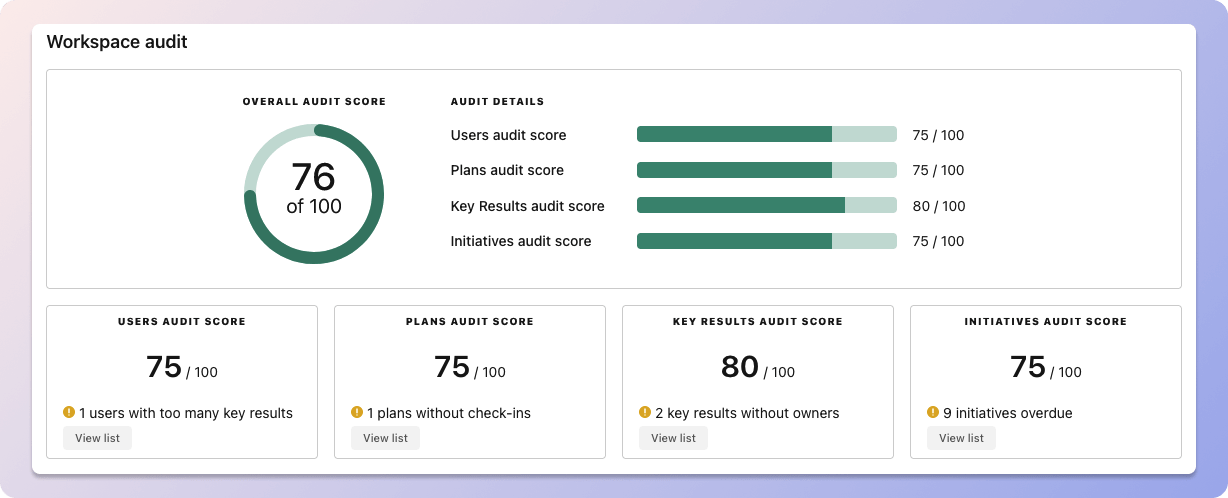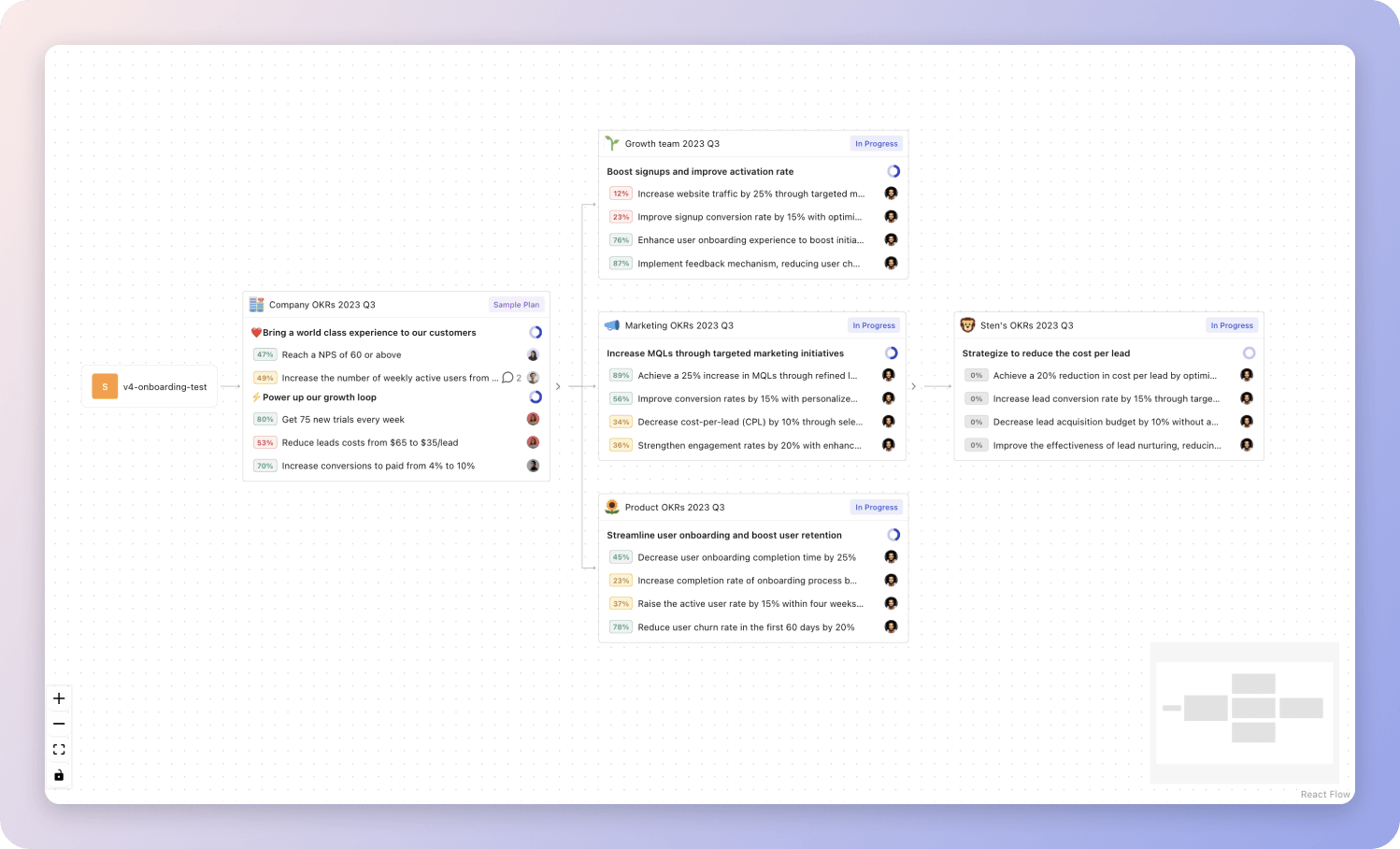3 OKR examples for New Members
What are New Members OKRs?
The OKR acronym stands for Objectives and Key Results. It's a goal-setting framework that was introduced at Intel by Andy Grove in the 70s, and it became popular after John Doerr introduced it to Google in the 90s. OKRs helps teams has a shared language to set ambitious goals and track progress towards them.
OKRs are quickly gaining popularity as a goal-setting framework. But, it's not always easy to know how to write your goals, especially if it's your first time using OKRs.
To aid you in setting your goals, we have compiled a collection of OKR examples customized for New Members. Take a look at the templates below for inspiration and guidance.
If you want to learn more about the framework, you can read more about the OKR meaning online.
Best practices for managing your New Members OKRs
Generally speaking, your objectives should be ambitious yet achievable, and your key results should be measurable and time-bound (using the SMART framework can be helpful). It is also recommended to list strategic initiatives under your key results, as it'll help you avoid the common mistake of listing projects in your KRs.
Here are a couple of best practices extracted from our OKR implementation guide 👇
Tip #1: Limit the number of key results
Focus can only be achieve by limiting the number of competing priorities. It is crucial that you take the time to identify where you need to move the needle, and avoid adding business-as-usual activities to your OKRs.
We recommend having 3-4 objectives, and 3-4 key results per objective. A platform like Tability can run audits on your data to help you identify the plans that have too many goals.
 Tability's audit dashboard will highlight opportunities to improve OKRs
Tability's audit dashboard will highlight opportunities to improve OKRsTip #2: Commit to the weekly check-ins
Having good goals is only half the effort. You'll get significant more value from your OKRs if you commit to a weekly check-in process.
Being able to see trends for your key results will also keep yourself honest.
 Tability's check-ins will save you hours and increase transparency
Tability's check-ins will save you hours and increase transparencyTip #3: No more than 2 yellow statuses in a row
Yes, this is another tip for goal-tracking instead of goal-setting (but you'll get plenty of OKR examples below). But, once you have your goals defined, it will be your ability to keep the right sense of urgency that will make the difference.
As a rule of thumb, it's best to avoid having more than 2 yellow/at risk statuses in a row.
Make a call on the 3rd update. You should be either back on track, or off track. This sounds harsh but it's the best way to signal risks early enough to fix things.
Building your own New Members OKRs with AI
While we have some examples below, it's likely that you'll have specific scenarios that aren't covered here. There are 2 options available to you.
- Use our free OKRs generator
- Use Tability, a complete platform to set and track OKRs and initiatives
- including a GPT-4 powered goal generator
Best way to track your New Members OKRs
Your quarterly OKRs should be tracked weekly in order to get all the benefits of the OKRs framework. Reviewing progress periodically has several advantages:
- It brings the goals back to the top of the mind
- It will highlight poorly set OKRs
- It will surface execution risks
- It improves transparency and accountability
We recommend using a spreadsheet for your first OKRs cycle. You'll need to get familiar with the scoring and tracking first. Then, you can scale your OKRs process by using a proper OKR-tracking tool for it.
 Tability's Strategy Map makes it easy to see all your org's OKRs
Tability's Strategy Map makes it easy to see all your org's OKRsIf you're not yet set on a tool, you can check out the 5 best OKR tracking templates guide to find the best way to monitor progress during the quarter.
New Members OKRs templates
We've covered most of the things that you need to know about setting good OKRs and tracking them effectively. It's now time to give you a series of templates that you can use for inspiration!
You will find in the next section many different New Members Objectives and Key Results. We've included strategic initiatives in our templates to give you a better idea of the different between the key results (how we measure progress), and the initiatives (what we do to achieve the results).
Hope you'll find this helpful!
OKRs to attract 400 new members to our community
Attract 400 new members to our community
Initiate two referral programs leading to 100 more community members
Follow up and onboard the new community members properly
Identify potential referral avenues and design two distinct programs
Promote the referral programs via social media and email marketing
Improve website conversion rate by 10% to encourage community sign-ups
Optimize landing page design and layout for user engagement
Implement clear, compelling calls-to-action towards community sign-up
Test and improve website loading speed
Execute 3 targeted marketing campaigns, each attracting a minimum of 100 new members
Adjust strategies based on captured data to attract new members
Implement campaigns, tracking their success and reach
Develop individual strategies for three targeted marketing campaigns
OKRs to successfully adapt and contribute to the new team and project
Successfully adapt and contribute to the new team and project
Establish effective rapport with 100% of the team members within the first month
Facilitate team bonding activities or events
Regularly communicate and provide feedback to the team
Schedule one-on-one introductory meetings with each team member
Fully understand project scope and deliver 3 actionable insights by end of month two
Brainstorm and identify key areas for essential insights
Develop and finalize three actionable insights based on analysis
Review and dissect all project scope details meticulously
Successfully deliver assigned tasks with at least 90% punctuality over the quarter
Utilize a planner or digital tool for schedule management
Regularly review and adjust task timelines as needed
Prioritize tasks according to deadlines and important
OKRs to implement a new CMS successfully
Implement a new CMS successfully
Train and upskill DevOps team members to effectively support and maintain the CMS
Decrease the average time to resolve CMS-related issues by 20%
Conduct regular audits to identify and address recurring CMS-related issues proactively
Implement regular training sessions for CMS support staff to enhance their technical skills
Streamline CMS Issue Resolution Process through Standard Operating Procedures (SOPs) and guidelines
Improve communication channels to expedite issue escalation and resolution
Collaborate with the service partner to ensure smooth integration of the CMS
Clearly define the roles and responsibilities of each team member involved in the integration process
Establish a communication protocol to ensure efficient information sharing between all parties involved
Develop a structured timeline with key milestones for the CMS integration project
Set up regular meetings with the service partner to discuss the CMS integration progress
Successfully deploy and configure the new CMS on the production environment
Collaborate with IT team to ensure compatibility of CMS with existing infrastructure
Conduct thorough testing of the new CMS on a staging environment before deployment
Develop a detailed step-by-step deployment plan for CMS implementation
Configure user permissions and roles in the production environment for effective CMS usage
More New Members OKR templates
We have more templates to help you draft your team goals and OKRs.
OKRs to enhance the organization's cybersecurity infrastructure
OKRs to successful Exchange and Migration of Server Systems
OKRs to process and complete all outstanding tax returns
OKRs to enhance leadership skills in the finance department
OKRs to obtain position as Director of Product
OKRs to launch and redesign our website
OKRs resources
Here are a list of resources to help you adopt the Objectives and Key Results framework.
- To learn: Complete 2024 OKR cheat sheet
- Blog posts: ODT Blog
- Success metrics: KPIs examples